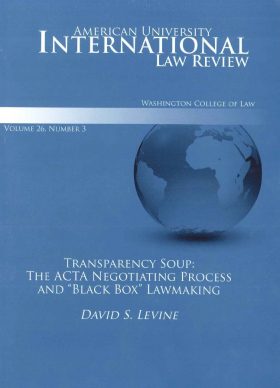Elon Law professor David Levine's article, "Transparency Soup: The ACTA Negotiating Process and 'Black Box' Lawmaking," has been published in the American University International Law Review, Volume 26, Number 3.

In the article, Levine examines the negotiation process in the development of the Anti-Counterfeiting Trade Agreement (ACTA), describing detrimental impacts from limited public input and transparency in the process.
“ACTA’s lack of transparency has mutated what would otherwise have been a largely public debate about ACTA’s merits and terms into a hearsay-laden, speculative melee,” Levine writes.
Noting that the agreement is likely to become among the most significant intellectual property laws in history, Levine explores what the secretive negotiation process, including a stream of leaked, unofficial versions of the agreement, may mean for future international agreements and for operational procedure surrounding federal policy formation more broadly.
“ACTA negotiations have revealed an emerging trend in freedom of information scenarios where the government and commercial interests, working closely together, appear to have a mutual concern in keeping information of significant national concern from the public,” Levine writes.
Four primary concerns about ACTA’s secretive process, Levine writes, are:
“(1) general erosion of deliberative democracy, (2) one-sided input that reflects primary commercial perspectives, (3) speculation and guesswork replacing real discussion of the issues, and (4) deterioration of the legitimacy of the process and the law being created.”
“Although the agreement is not yet final, we already know that the lack of transparency placed leaked documents and hearsay at the center of public policy discussions, caused debates over both real and imagined issues, and brought about a general erosion of public knowledge and confidence in the ACTA process,” Levine writes.
Click here to download Levine’s article in full and for access to other articles in the publication.
The American University International Law Review is a publication of the American University Washington College of Law and is one of the ten most frequently cited international and comparative student law reviews in the United States. The focus of the Volume 26, Number 3 edition of the reviews was “Intellectual Property Law Enforcement and The Anti-Counterfeiting Trade Agreement (ACTA).”
Click here for more information on Elon law professor David Levine.
In his article, Levine thanks Elon students, Daniel Nicotera (L’11) and Anna Arnopolsky (L’12) for their research assistance. He also thanks Elon Law professors, Andy Haile, Eric Fink, Tom Molony and Michael Rich for their comments and suggestions.



